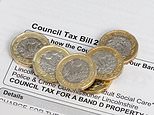The Conservative Party has raised concerns over a proposal by the Labour Party to introduce a new system of council tax bands that could significantly raise taxes for many households in England. Shadow Housing Secretary has described the initiative as a “Left-wing plot” aimed at extracting more money from residents, particularly those in higher income brackets.
According to Conservative housing spokesperson, the proposed changes could result in households in the top tax band paying nearly nine times more than those in the lowest band. This disparity raises questions about the fairness and economic impact of the Labour proposal, which seeks to reform the current council tax system established in the 1990s.
Details of the Proposal
The Labour Party’s plan involves creating a total of 14 council tax bands, a significant increase from the existing eight. This move is intended to address concerns about affordability and equity in the current tax structure. However, critics argue that the new system could disproportionately affect families already struggling with rising living costs.
The Conservative Party has expressed strong opposition to the initiative, claiming it could lead to an increase in financial strain for average households. They argue that the reform would primarily benefit wealthier individuals while imposing a heavier burden on those in the lower income brackets.
In a recent statement, the Conservative spokesperson emphasized that “this is not just a tax increase; it is a complete restructuring of how families will be taxed on their homes.” The spokesperson also highlighted that such a move could discourage home ownership and create further economic disparities.
Political Reactions and Implications
The debate surrounding the proposed council tax changes has sparked a broader discussion about fiscal responsibility and economic equity in England. Supporters of the Labour plan argue that the current system is outdated and fails to reflect the realities of today’s housing market, where property values have surged over the last few decades.
Opponents, including members of the Conservative Party, argue that any increase in taxation should be carefully considered, especially in light of the ongoing financial challenges faced by many households. The shadow housing secretary’s accusations of a “Left-wing plot” suggest a growing divide in the political landscape regarding taxation and public spending.
As the debate continues, it remains to be seen how this proposal will affect local councils and their ability to deliver essential services. The outcome could have lasting implications for residents across England, as local governments depend on council tax revenue to fund a variety of programs and initiatives.
In conclusion, the discussion around the Labour Party’s proposal for new council tax bands underscores the complexities of tax reform in a changing economic environment. With strong opinions expressed on both sides, the potential impact on households remains a critical issue for voters as political parties prepare for future elections.







